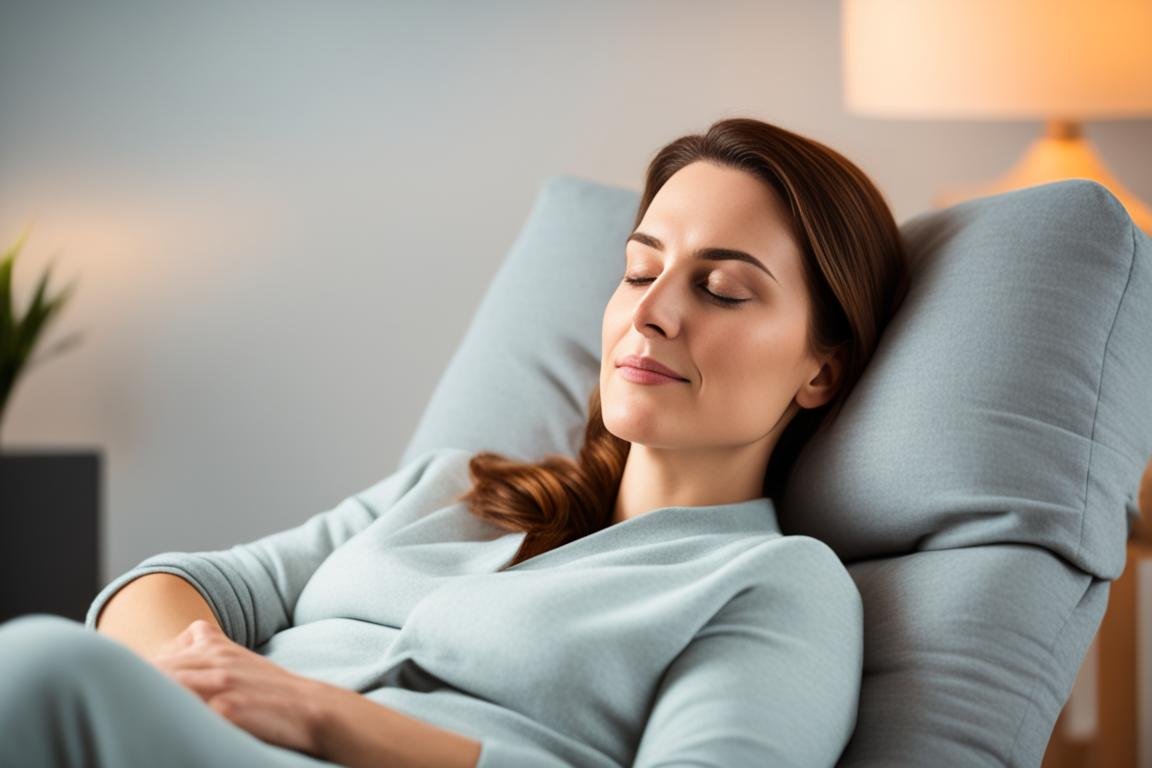Upright in a recliner is cozy and helps with health issues like acid reflux, sleep apnea, back pain, and circulation issues. But sleeping like this often can have bad effects too. It could mess up your sleep, hurt your posture, and bring more apnea events, blood clots, and less breath function.
Talk to your doctor before making a choice. They can help you think about the good and bad stuff of sleeping in a recliner. Remember, using extra pillows and adjusting your mattress might help a lot. A recliner can be good if you use it wisely for your rest.
Key Takeaways
- Sleeping in a recliner can provide relief for certain health conditions like acid reflux and sleep apnea.
- Recliner sleeping may disrupt sleep quality and cause posture problems if not done properly.
- Consult your doctor to determine if the benefits of sleeping in a recliner outweigh the potential risks for your specific needs.
- Use additional pillows and adjustments to optimize comfort and support when sleeping in a recliner.
- Alternate between recliner and traditional bed sleeping to prevent negative effects from prolonged use.
The Rising Popularity of Recliner Sleeping
Many people choose to sleep in a recliner chair. This is especially true if they have health issues. These include acid reflux, sleep apnea, and back pain. The tilted position of a recliner can reduce symptoms from these problems. Yet, we must consider both the benefits and risks of sleeping in a recliner before doing it often.
Recliners are now known for more than just resting. They’re great for reading, watching TV, and even sleeping. Doctors sometimes suggest sleeping in a recliner. This is because it can help keep your body in a good sleep posture. Recliners today also come with extras like massages and Bluetooth. These make them very appealing to buyers.
The Mcombo Electric Power Lift Recliner Chair is a top choice. It has massage features, showing how recliners have improved. Things like white noise or TV can also help you sleep better. For adults with sleep apnea, this can be really useful. Recliners can also help keep you cool. Many find it easier to sleep when it’s cooler.
Doctors may tell some patients to sleep in a recliner. This is for those with specific health issues. For example, those with sleep apnea or emphysema. Sleeping a bit upright can make breathing easier. It does this by helping blood flow better. Recliners that lift your legs up can improve blood flow even more. This can be good for back pain too.
In short, more and more people are choosing to sleep in recliners. They find them comfy and helpful for different health issues. Plus, recliner designs keep getting better. They offer new features that fit the changing needs of consumers. Still, it’s smart to think about the good and bad points before you start sleeping in a recliner often.
Potential Benefits of Sleeping in a Recliner
Sleeping with the head up can lower acid reflux symptoms. It stops stomach acid from bothering the throat. This means less heartburn, coughing, and nausea. Also, it helps people with sleep apnea by keeping their airways clear. If you sleep in a 30-degree recline, it might cut down sleep apnea problems a lot.
Alleviating Acid Reflux and Improving Digestion
A reclined chair can ease pressure on your lower back. By lifting your legs, you help blood flow and lessen swelling.
Assisting Sleep Apnea and Enhancing Sleep Quality
For sleep apnea, a recliner can be great. It can cut apnea events in half. This means better sleep for you.
Relieving Back Pain
A recliner can help your back too. It’s better for your joints and might make your back feel better.
Improving Circulation
Lift your feet with the recliner, and your blood flows better. This cuts down on swelling and helps your whole body.
Potential Drawbacks of Recliner Sleeping
Sleeping in a recliner can feel good for some health issues. Yet, it has downsides to know. Our bodies need different kinds of deep sleep. Sitting up all the way might make this hard. It could lower how well we sleep.
Disrupting Sleep Cycles
Sitting wrong in a chair can cause bad posture, tight muscles, and pain in the neck, shoulders, and back. These problems can make sleeping hard. You might wake up feeling stiff.
Causing Neck and Back Strain
Being fully upright at night may stop gravity from helping our breathing. This might make sleep apnea worse for some people. Those with sleep apnea might have more breathing problems in a recliner.
Exacerbating Sleep Apnea in Some Cases
Being partly reclined makes it tough for your chest and lungs to move freely. This can lessen how well we breathe while asleep. So, it can spoil our sleep and breath comfort.
Decreasing Lung Capacity
Lifting your legs up can cause blood to not move well in the legs. It can lead to serious blood clots. This is very risky if you have heart or leg issues.
Increasing Blood Clot Risk
Using a recliner to sleep may help some health problems. But it’s always good to think about the bad sides. Talk to your doctor to find the best sleep choice for you.
sleeping in a recliner: A Viable Option for Certain Conditions
Sleeping in a recliner can be comfy and help with some health issues. These include acid reflux, sleep apnea, back pain, and circulation problems. Yet, it’s vital to think about the good and bad before sleeping this way regularly.
Think about your health needs. Chat with your doctor to see if recliner sleeping is good for you. If it’s a recommended choice for your health, trying it may be a good idea.
| Potential Benefits of Recliner Sleeping | Potential Drawbacks of Recliner Sleeping |
|---|---|
|
|
Recliner sleeping might be good for some health issues. But, it’s key to carefully consider the benefits and downsides. Talk to your healthcare provider to see if it’s right for you.
Optimizing Comfort for Recliner Sleeping
To sleep well in a recliner, pay attention to your spine, use pillows smartly, change how you sleep, and move and stretch often. Do these things to make recliner sleeping comfy and get the most out of it. Check out our [tips for comfortable recliner sleeping] and [how to optimize recliner sleeping].
Achieving Proper Spine Alignment
Adjust the recliner’s back and leg rest to keep your spine right. Your knees need to be lower than your hips. Make sure your head, neck, and spine are in a straight line. This keeps your spine healthy and you comfy.
Using Supportive Pillows Strategically
Put pillows under your neck, back, knees, and arms to stop pain and strain. Pillows fill the spaces, add softness, and keep you in good shape. This makes recliner sleep much nicer. For more tips, look at our [tips for comfortable recliner sleeping].
Alternating Sleeping Positions
Switch between sleeping in the recliner and bed to get different body support. This change helps you make the most of both ways of sleeping. It’s good for your body’s needs.
Frequently Re-Adjusting and Stretching
Use a timer or alarm to remind you to move, stretch, and change how you’re sitting every few hours. After waking, do gentle stretches for your neck, shoulders, back, and hips. This keeps you from feeling stiff and helps you follow the [recliner sleeping position recommendations].
When to Avoid Sleeping in a Recliner
Sleeping in a recliner can help with some health issues. But, there are times when you shouldn’t do it. If your doctor says no for health reasons, it’s best not to. Also, sleeping in a recliner with a baby is very dangerous and should always be avoided.
If you have problems with your lungs, be careful. The reclined position can make it hard for you to get enough oxygen. Talk to your doctor before sleeping in a recliner often. They can tell you about the risks and precautions.
| Scenario | Recommendation |
|---|---|
| Doctor advises against it for medical reasons | Completely avoid sleeping in a recliner |
| Co-sleeping with an infant | Prevent this at all costs – it’s potentially life-threatening |
| Having lung problems | Consult your doctor before regularly sleeping in a recliner |
Think about when sleeping in a recliner is not recommended. This way, you can use it safely for your health needs.
Consulting with a Healthcare Professional
Before you start sleeping in a recliner often, talk with your doctor. Ask for their advice on this. They can tell you if it’s okay for you, based on your health.
Tell your doctor about any trouble sleeping. Mention things like acid reflux, or not breathing well at night. Your doctor will look at the good and the bad of sleeping in a recliner regularly.
Listen to what your doctor says. They’ll give you tips for better recliner sleep. This includes how to sit, how long, and what to watch out for. They want to make sure recliner sleep is good for you.
Space-Saving Advantages of Recliner Sleeping
If you live in a small apartment or value space, a recliner is a smart choice. Recliners are great because they take up less room than a bed. This makes them perfect for saving space in your home. Want to learn how to pick a good recliner? Then check out our helpful guide.
Recliners are not just for sleeping. They’re also perfect for relaxing, watching TV, or reading. This makes them a top pick for tiny homes. By using a recliner for sleep, you can keep your room tidy without giving up on comfort.
| Benefit | Description |
|---|---|
| Space-Saving | Recliners occupy less floor space compared to traditional beds, making them a practical choice for smaller living spaces. |
| Versatility | Recliners serve as both a sleeping surface and a comfortable chair for relaxation, reading, or watching TV, maximizing the use of available space. |
| Convenience | With the ability to recline and adjust the chair’s position, recliners offer a convenient sleeping option without the need for a dedicated bed. |
Whether you’re in a snug apartment or want to use your space better, a recliner might be the key. By looking at your space and needs, you can choose a recliner that is comfy and space-saving.
Recliner Sleeping: A Potential Solution or Temporary Fix?
A recliner might give you a good rest when other choices don’t work. It’s smart to think carefully before making it a regular thing, though. Talk with your doctor about whether it’s a good idea for you. Make sure it’s better than other ways to get comfortable sleep, like using extra pillows or changing your mattress.
Recliners are great for some problems, like acid reflux or back pain. But, they have some downsides. They could mess up your sleep, make breathing problems worse, and up your chance of blood clots. Make sure you really need it before making it your main way to sleep. Always talk to your doctor first to see if there’s a better, long-term solution for you.
Using a recliner now and then for a better sleep is fine. But, don’t use it all the time. There are many other sleeping aids to try, like adjustable beds or special devices. You should look for what’s causing your sleep problems. Your doctor can help you figure out the best way to sleep well, considering your specific needs.




